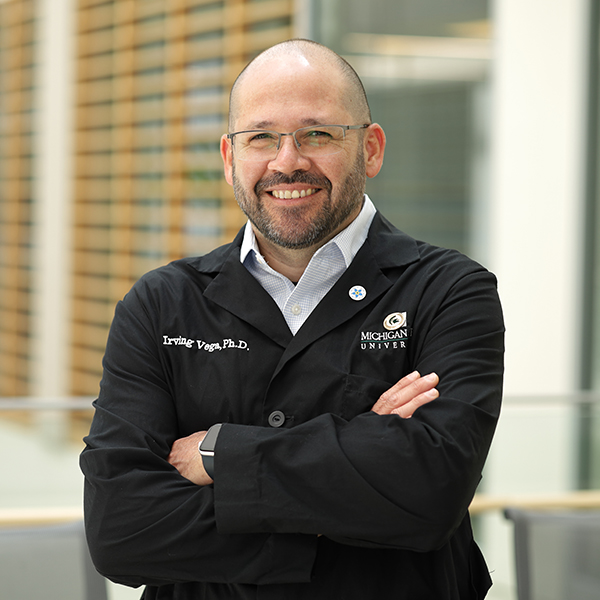Irving E. Vega, PhD

- Red Cedar Distinguished Associate Professor
- Department of Translational Neuroscience
- Michigan State University College of Human Medicine
- Teaching Faculty, MSU Neuroscience Program
- Grand Rapids Research Center
- 400 Monroe Ave NW, Grand Rapids, MI 49503
- Phone: 616.234.2828
- Fax: 616.234.0991
- irving.vega@hc.msu.edu
Biography
Irving E. Vega, Ph.D., is the Red Cedar Distinguished Associate Professor in the Department of Translational Neuroscience at Michigan State University College of Human Medicine. He earned his B.S. in Biology from the University of Puerto Rico–Mayagüez and his Ph.D. in Molecular Biology and Neuroscience from Rutgers University, followed by postdoctoral training at Mayo Clinic Jacksonville.
Dr. Vega’s research program integrates two complementary tracks. The first focuses on understanding the molecular and biochemical processes that lead to the accumulation of pathological proteins, particularly tau, which drive neurodegeneration in Alzheimer’s disease and related dementias. His laboratory applies advanced proteomics and biochemical approaches to uncover mechanisms of protein aggregation and identify novel therapeutic targets, contributing to translational strategies aimed at slowing or preventing disease progression.
The second track emphasizes community-engaged research to examine contextual and social factors that influence risk and resilience to neurodegenerative diseases across the lifespan. Through strong community–academic partnerships, Dr. Vega works to improve representation of diverse populations in dementia research and to advance strategies that reduce health disparities in Alzheimer’s disease.
Dr. Vega has extensive experience in project management and research leadership, serving as principal investigator or co-investigator on multiple NIH-funded projects, including initiatives focused on molecular neuropathology, health disparities, and workforce development. His leadership roles in national and institutional programs reflect a sustained record of success in building collaborative teams and advancing impactful research.
Education
| Institution | Field of Study | Degree | Year |
|---|---|---|---|
| University of Puerto Rico-Mayagüez Campus | Biology | B.S. | 1996 |
| Rutgers, The State University of New Jersey | Cell Biology and Neuroscience | Ph.D. | 2002 |
Research Interests
Understanding molecular mechanisms driving pathological tau accumulation in neurodegenerative diseases and exploring contextual factors that shape risk and resilience across the lifespan.
PublicationsResearch and Engagement Expertise
- Mass Spectrometry-Based Proteomics for biomarker discovery and protein interaction analysis
- Protein Biochemistry and Molecular Assays, including ELISA, Western blot, and liquid chromatography
- Protein Purification and In Vitro Functional Assays to study aggregation and phase separation mechanism
- Immunohistochemistry and Histological Analysis for neuropathology in human and animal tissues
- Molecular Biology Techniques, including cloning and site-directed mutagenesis for mechanistic studies
- Cell Culture Models for neurodegeneration and protein aggregation research
- Mouse Models of Tauopathy and Related Neurodegenerative Disorders for translational studies
- Community-Engaged Research Methods, including survey design, qualitative analysis, and mixed-method approaches
- Development and Leadership of Community–Academic Partnerships to advance brain health awareness and improve representation in dementia research
- Implementation of Outreach and Education Programs to promote risk reduction strategies and support caregivers
National Service and Professional Leadership
- Standing Member, NIH Chronic Dysfunction and Integrative Neurodegeneration Study Section
- Professional Development Committee Member, Society for Neuroscience
- Chair, Neuroscience Scholars Program Subcommittee (NSPS), Society for Neuroscience
- Member, U.S. Consortium of Aging, Dementia and Latino Studies (CADLAS)
- Editorial Board Member, Frontiers in Neuroscience (Neurodegeneration Section)

